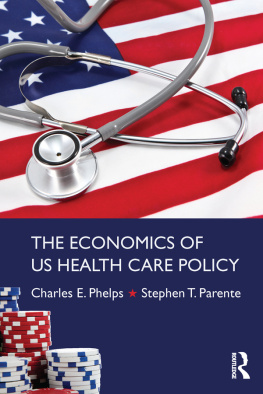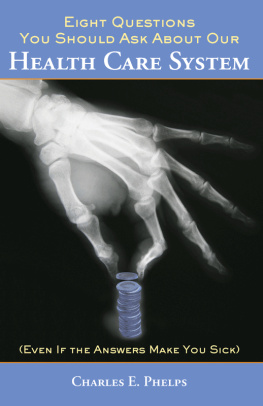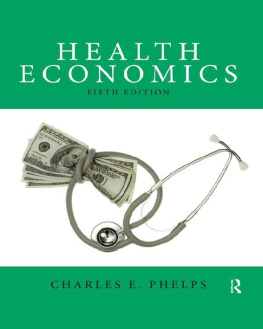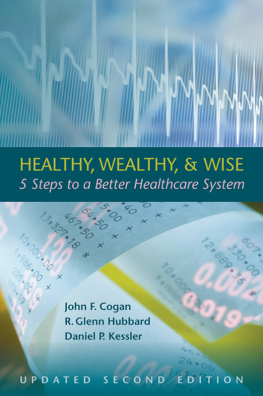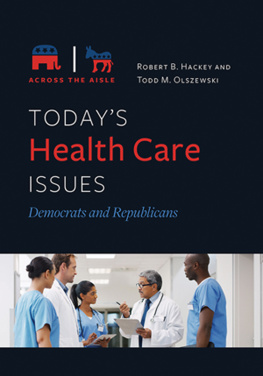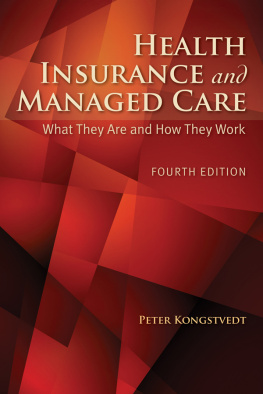The Economics of US Health Care Policy
In this book, Phelps and Parente explore the US health care system and set out the case for its reform. They trace the foundations of todays system, and show how distortions in the incentives facing participants in the health care market could be corrected in order to achieve lower costs, a higher quality of care, a higher level of patient safety, and a more efficient allocation of health care resources.
Phelps and Parente propose novel yet economically robust changes to US tax law affecting health insurance coverage and related issues. They also discuss a series of specific improvements to Medicare and Medicaid, and assess potential innovations that affect all of health care, including chronic disease management, fraud and abuse detection, information technology, and other key issues.
The Economics of US Health Care Policy will be illuminating reading for anyone with an interest in health policy, and will be a valuable supplementary text for courses in health economics and health policy, including for students without advanced training in economics.
Charles E. Phelps was elected to the Institute of Medicine (now the National Academy of Medicine) in 1991. From 1984 to 2010 he was on the faculty of the University of Rochester (NY), in the departments of economics, political science, and public health sciences, and he served for 13 years as Provost (Chief Academic Officer) and is University Professor and Provost Emeritus at the University of Rochester, USA.
Stephen T. Parente is Professor of Finance at Carlson School of Management, University of Minnesota, Minneapolis, USA. In Washington DC, he has served as Governing Chair of the Health Care Cost Institute, a US Congressional Budget Office health advisor, a senior health policy advisor to Senator John McCain (R-AZ) and a legislative fellow for Senator John D. Rockefeller IV (D-WV).
The Economics of US Health Care Policy
Charles E. Phelps and
Stephen T. Parente
First published 2018
by Routledge
2 Park Square, Milton Park, Abingdon, Oxon, OX14 4RN
and by Routledge
711 Third Avenue, New York, NY 10017
Routledge is an imprint of the Taylor & Francis Group, an informa business
2018 Charles E. Phelps and Stephen T. Parente
The right of Charles E. Phelps and Stephen T. Parente to be identified as authors of this work has been asserted by them in accordance with sections 77 and 78 of the Copyright, Designs and Patents Act 1988.
All rights reserved. No part of this book may be reprinted or reproduced or utilised in any form or by any electronic, mechanical, or other means, now known or hereafter invented, including photocopying and recording, or in any information storage or retrieval system, without permission in writing from the publishers.
Trademark notice: Product or corporate names may be trademarks or registered trademarks, and are used only for identification and explanation without intent to infringe.
British Library Cataloguing-in-Publication Data
A catalogue record for this book is available from the British Library
Library of Congress Cataloging-in-Publication Data
Names: Phelps, Charles E., editor. | Parente, Stephen T. (Stephen Thomas), 1965- editor.
Title: The economics of US health care policy / Charles E. Phelps and Stephen T. Parente.
Description: Abingdon, Oxon ; New York, NY : Routledge, 2018. | Includes bibliographical references and index.
Identifiers: LCCN 2017031429| ISBN 9780415784313 (hardback) | ISBN 9780415784320 (pbk.) | ISBN 9781315228518 (ebook)
Subjects: | MESH: Delivery of Health Care--economics | Health Care Reform--economics | Insurance, Health--economics | Health Policy--economics | United States
Classification: LCC HG9396 | NLM W 74 AA1 | DDC 368.38/200973--dc23
LC record available at https://lccn.loc.gov/2017031429
ISBN: 978-0-415-78431-3 (hbk)
ISBN: 978-0-415-78432-0 (pbk)
ISBN: 978-1-315-22851-8 (ebk)
Typeset in Goudy
by Sunrise Setting Ltd, Brixham, UK
To Dale and Carriethey light up our lives in
every season and in every way
Contents
The Economics of US Health Care Policy is not a general survey of Health Care Economics. Rather it is a brilliant laser-like exposition of the distortive incentives that negatively alter behavior in the American health care financing and delivery system and a set of well-conceived proposals for how to fix them. The distortive incentives are largely the result of public policies that were enacted without any or adequate consideration of the economic incentives they created or their long-term consequences. The analytical tools are classical economics, but the book is written for the general (non-economist) reader who is interested in understanding our present health-economic predicament. The book is not about the current debate over the proposed repeal and replacement of the Affordable Care Act. The issues pre-dated the Affordable Care Act and are likely to remain after enactment of any replacement.
The National Academies of Sciences estimated that some 30 to 40% of US health expenditures are waste, that is they do not contribute to the better health of patients. Passing laws against waste doesnt work. The only things that can work are strong incentives that reward economical behavior.
As the authors observe, The major problem comes with the reliance of our health care financing system on a tax-subsidized system of employer-provided health insurance. And indeed, this system is the original sin of American health care finance. And the authors were absolutely right in attacking it first and starting with a sensible proposal to correct it. Their novel and constructive proposal is to abolish the tax exclusion of employer contributions from the taxable incomes of employees, and to return all the savings to taxpayers in the form of reduced personal and payroll tax rates. Then people would come to realize that health insurance and health services cost a great deal, and they and their doctors (acting in their patients best interests) would choose services wisely. The lower tax rates would encourage work and economic growth.
Separating health insurance from jobs would have many benefits. Some people would like to leave their employer either to a better job or to start their own business. But they have been inhibited by the loss of tax subsidized health insurance, known in the trade as job lock.
The incentives in the current system are cost-increasing. The first incentive is to cover in the tax-free premium everything that might be described as health caredeductibles, copayments, dental care, eye glasses, hearing aids, etc. to take advantage of the tax breakto leave employees unconscious of what these things cost and therefore uninterested in shopping for value-for-money or using these resources wisely. Employers dont mind because they just take the cost out of what otherwise would be wages and salaries.
If I had been writing a book on this general subject, I probably would have started by attacking our dominant model of open-ended, uncoordinated, third-party-paid fee for service, because that too is filled with perverse incentives. (Open ended refers to the lack of any prior budget or resource constraint, uncoordinated refers to physician autonomy and the lack of teamwork or information sharing, third-party payment refers to the fact that the entity that pays the bills is not the one that makes the expenditure decisions.) The incentives are to resolve all doubts about value to the patient in favor of doing more services, whether or not more are beneficial for the patient. This model was not the consequence of the workings of the free market. Rather, it came about as a consequence of the coercive political power of organized medicine (that is the American Medical Association and the affiliated county medical societies that, for example, could and did expel doctors who wanted to develop alternative forms of organization and payment). Employers, for their own reasons, have chosen to use their control over employee health care, not to offer employees cost-conscious choices, but to lock them into the uncoordinated, open-ended fee for service model. Where employees are offered such a responsible choice of health plan (e.g., Federal Employees, California and Wisconsin state employees) most choose economical Health Maintenance Organizations (HMOs) or High-Deductible Health Plans (HDHPs).

